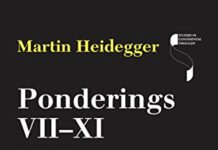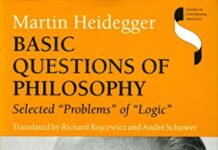
Ebook Info
- Published: 2014
- Number of pages: 312 pages
- Format: PDF
- File Size: 2.18 MB
- Authors: Martin Heidegger
Description
Martin Heidegger’s 1934–1935 lectures on Friedrich Hölderlin’s hymns “Germania” and “The Rhine” are considered the most significant among Heidegger’s lectures on Hölderlin. Coming at a crucial time in his career, the text illustrates Heidegger’s turn toward language, art, and poetry while reflecting his despair at his failure to revolutionize the German university and his hope for a more profound revolution through the German language, guided by Hölderlin’s poetry. These lectures are important for understanding Heidegger’s changing relation to politics, his turn toward Nietzsche, his thinking about the German language, and his breakthrough to a new kind of poetic thinking. First published in 1980 as volume 39 of Heidegger’s Complete Works, this graceful and rigorous English-language translation will be widely discussed in continental philosophy and literary theory.
User’s Reviews
Editorial Reviews: Review “[This translation], including a clear and concise introduction and useful glossaries, attains both accuracy and clarity, rarely faltering in its choice of words.”―Notre Dame Philosophical Reviews”Translated with skill and precision, these lectures . . . not only present the most penetrating analysis of two of Hölderlin’s most significant hymns but also constitute Heidegger’s most illuminating and fully argued encounter with Hölderlin. . . . Recommended.”―Choice”The translators have clearly mastered Heidegger’s own way of reading and interpreting these Hölderlin texts. They convey an intimate knowledge of Heidegger’s German and its deepest meanings without sacrificing the idiosyncratic character of Heidegger’s prose style. What emerges is an English-language Heidegger for our times.”―Charles Bambach, University of Texas – Dallas”The translation of Heidegger’s first public engagement with Hölderlin represents a significant event in Heidegger studies. These lectures are also extremely important for assessing Heidegger’s political commitments during the period, the crucial years of his involvement with National Socialism and the Nazi party, and his understanding of the poet’s role in bringing to articulation what he understands as the destiny of a people.”―Christopher Fynsk, University of Aberdeen Review The translation of Heidegger’s first public engagement with Hölderlin represents a significant event in Heidegger studies. These lectures are also extremely important for assessing Heidegger’s political commitments during the period, the crucial years of his involvement with National Socialism and the Nazi party, and his understanding of the poet’s role in bringing to articulation what he understands as the destiny of a people. — Christopher Fynsk ― University of Aberdeen About the Author William McNeill is Professor of Philosophy at DePaul University.Julia A. Ireland is an Assistant Professor at Whitman College. She has translated (with William McNeill) Hölderlin’s Hymn “The Ister” (IUP, 1996). Excerpt. © Reprinted by permission. All rights reserved. Hölderlin’s Hymns “Germania” and “The Rhine”By Martin Heidegger, William McNeill, Julia IrelandIndiana University PressCopyright © 1980 Vittorio Klostermann, Frankfurt am MainAll rights reserved.ISBN: 978-0-253-01421-4ContentsTranslators’ Foreword, xiii, Preliminary Remark, 1, Introduction, Part One “Germania”, 9, Chapter One Preparatory Reflection: Poetry and Language, Chapter Two The Fundamental Attunement of Poetizing and the Historicality of Dasein, Part Two “The Rhine”, 133, Chapter One The Demigods as Mediating Middle between Gods and Humans. The Fundamental Attunement of the Poem. The Beyng of the Demigods and the Calling of the Poet, Chapter Two A More Incisive Review. Poetizing and Historical Dasein, Chapter Three That Which Has Purely Sprung Forth as Strife in the Middle of Beyng, Editor’s Epilogue, 268, Translators’ Notes, 271, German–English Glossary, 273, English–German Glossary, 281, CHAPTER 1Preparatory Reflection: Poetry and Language§ 2. Provisional Path of Approach to the Poem as a Piece of Texta) The Overarching Resonance of the Telling as Origin for the Choice and Positioning of WordsThe poem lies printed before us, a verbal construction that we can immediately read, repeat, and listen to. As this kind of linguistic construction it has a ‘meaning.’ The meaning is expressed on the one hand via the significance of the words whose content we can immediately grasp (“temple,” “flames of the grave,” “valley and rivers,” “Alps”), and on the other via images (“the flower of the mouth” in line 72, for language), and via peculiar sequences of words, for example in strophe VI, lines 87ff.:Denn Sterblichen geziemet die Schaam, Und so zu reden die meiste Zeit Ist weise auch von Göttern. For shame is fitting for mortals, And thus to speak most of the time, Of gods is also wise.This does not mean [as the German could conceivably be read (Tr.)] that it is appropriate for gods also to speak in such a way, if they wish to be wise. It means, rather, that to speak in such a way—namely of the gods—is something that is also indeed wise. Separating out words that belong together in this way here imparts a peculiar and significant compass to this hint concerning how to speak of the gods, and postponing the phrase “auch von Göttern” [“also of gods”] right until the end of the line sets it sharply into relief in such a way that nothing else follows it, for something different then begins: “Yet where more overflowing….” In addition to the choice of words, positioning of words, and the sequencing of words, it is then above all the entire overarching resonance of the poetic telling that ‘expresses’ the so-called meaning. Yet this overarching resonance of the telling is not simply the result of the positioning of words and arranging of lines, but rather the reverse: The overarching resonance of the telling is the initial, creative resonance that first intimates the language; it is the origin not only for the arranging and positioning of the words, but also for the choice of words, an origin whose resonance constantly anticipates the use of words. This overarching resonance of the telling, however, is from the outset determined by the fundamental attunement of the poetry, which takes form within the inner outline of the whole. The fundamental attunement for its part grows out of the particular metaphysical locale of the poetry in question.Yet all of this will have to become manifest to us directly and in its unity and purity with respect to the individual poems themselves. To start with, we shall seek a provisional, albeit tentative, path for approaching the effective domain of this particular poem.b) ‘Content and Form’ of the Poem, ‘Depiction in Images’It has long been the custom with regard to a poem, as with artworks in general and in other domains too, to distinguish between ‘content’ and ‘form.’ The distinction is hackneyed, and can be used for anything and everything. It gives the appearance of being an absolute, supra-temporal determination, and yet it is entirely Greek, coming solely from Greek existence, and is therefore worthy of question, even if one were to say that something so ingrained and taken for granted can no longer be undone. Along the lines of this content–form distinction one can initially find an accommodating schema in analyzing the poem. The content is relatively simple and easy to identify: The old gods are dead, new ones are emerging. Germania has a special mission with regard to their arrival.The form of the poem likewise presents no particular difficulties. It consists of seven sixteen-line strophes. The meter does not fit into any of the traditional poetic genres. Nor does the poem have any rhymes. A poem without meter and without rhymes is really no ‘poem’ at all; it is more prose than poetry. And this is how it appears, especially when we consider the altogether banal conjunctions, for example, “For full of expectation …” (line 6); or “For when it is out …” (line 20). “For”—a poet says “For” in a poem? And even ‘it is out’! And yet—this commonplace, hackneyed, prosaic “For” sounds as though it were spoken for the first time, and this seeming prosaicness of the entire poem is more poetic than the slickest line-hopping and melodic rhyming of a song by Goethe or of any other singsong.Furthermore, the poem “Germania” evidently gains greater power of poetic expression through the fact that its chief content—heralding the arrival of the new gods—is depicted in images: the messenger of the gods in the image of the eagle, Germania in the image of the dreamy child. It is indeed a cherished device for poets to symbolize what is actually real by means of the most sensuous possible images of what is, in fact, not real. This mode of depiction thus requires special consideration and ‘investigation.’One could, for instance, compare the image of the heralding of the gods here with the Annunciation to the Virgin Mary by the angel, and then further pursue the use of this motif by looking at how it is depicted in painting, for example, considering in turn how it is presented in different periods. One could also investigate where the figure of the eagle and other species of bird appear in the works of other poets, from Homer to Stefan George. Such ‘research’ projects are often a favorite occupation of academics, and are conducted along the lines of investigations such as that into the camel in Arabic literature (and this is not just made up). The explanation of poetic works is becoming ever greater in scope; and mostly nothing comes of it.c) Hölderlin’s ‘Worldview’It would surely be of greater importance to make some kind of statement assessing and evaluating the poem and this particular kind of poetry—that is, in this instance concerning the use of the aforementioned images. How does our poem measure up in that regard? Consider, for example, the image of Germania—a dreamy girl “hidden in the woods and flowering poppy” (line 65). This is more than a little ‘romantic’ when compared, say, to the Germania on the Niederwald monument: a fearsome woman with hair flying in the wind and a huge sword. By contrast, this Germania of Hölderlin is, as people say today, ‘unheroic.’ Yet we need not be surprised at this, for the use of this ‘feminine’ image manifestly fits in well with the ‘worldview’ of the poet. Hölderlin’s ‘worldview,’ if the use of this fateful word in conjunction with Hölderlin’s name is permitted for a moment, is expressed unmistakably in a manner ‘internal’ to the poem in its final lines. For there we read that Germania is to “defenselessly give counsel” to the peoples (line 111). Thus, Hölderlin is manifestly a ‘pacifist’ and stands for the defenselessness of Germania, and indeed for unilateral disarmament. That is very close to treason against one’s country. Yet this, after all, fits well the personality of the poet: He was unable to cope with life, nowhere managed to ‘assert’ himself, let himself be pushed from one house tutor position to another, and did not even manage to become a Privatdozent in philosophy, something he indeed tried to do in Jena.Thus this poem “Germania,” together with its poet, seems altogether out of season for our tough times, provided that the interpretation we have given is true, and provided that we can truly see the ‘character’ of the poet if we measure him only according to his ability to muscle through. As evidence that this assessment is profoundly untrue, we cite in advance two passages from his correspondence. First, the end of the aforementioned letter to his brother on New Year’s day (III, 371f.):I thank you a thousand times over for your encouraging remarks on my little poems, and for many another friendly and fortifying word in your letter. We must stick firmly together in all our need and in our spirit. Above all else we wish to adopt, with all love and with all seriousness, the great saying: homo sum, nihil humani a me alienum puto; it is not meant to make us frivolous, but only to make us true to ourselves and perspicuous and tolerant toward the world, but in addition we do not wish to be hindered by any idle talk of affectation, exaggeration, ambition, exceptionalism, or such things; we wish only to struggle using all our strengths and to observe with full acuity and tenderness how we bring all that is human in us and in others into an ever freer and more intimate connection, whether depicted in images or in the real world, and if the realm of darkness should ever invade with force, then we shall throw our pens under the table and proceed in God’s name to where the need is greatest, and to where we are most needed. Farewell! Yours, Fritz.The second passage is from a letter to his friend Neuffer half a year later, dated July 3, 1799 (III , 412f.):It cheers my heart when you devote yourself more and more to poetry. This epoch has cast such a heavy burden of impressions upon us that it is only, as I feel increasingly each day, through an extended period of activity that continues into old age, and through serious endeavors undertaken ever anew, that we may perhaps in the end be capable of producing that which nature in the first place gave us as our vocation, and which perhaps under other circumstances might have matured earlier, but hardly so completely. If we are called upon by duties that are truly sacred to us both, then we make a fine sacrifice to necessity too when we deny our love of the Muses, at least for a time.Compare Fragment 17 (IV, 249, lines 18ff.):und Feuer und Rauchdampf blüht Auf dürrem Rasen, Doch ungemischet darunter Aus guter Brust, das Labsaal Der Schlacht, die Stimme quillet des Fürsten. and fire and smoke vapor blossoms On arid grass, Yet unmixed beneath it From a fine breast, the refreshment Of the battle, issues the voice of the prince.Thus, the interpretation of the word “defenselessly” in our poem will not be so easy as the sound of the word suggests. In the end this procedure of ascertaining a ‘worldview’ from individual words and statements is altogether detrimental.§ 3. Entering the Domain in Which Poetry Unfolds Its PowerWe have recounted the main features of what is said in the poem and have described roughly how it is said. We have become acquainted with the poem, if only by way of a first read and a rough appraisal. And yet, becoming acquainted with a poem—even if this were to extend to the most minute details—does not yet mean standing within the domain in which poetry unfolds its power. Thus, we have to overcome the poem regarded as a piece of text that merely lies present before us. The poem must transform itself and become manifest as poetry.It is indeed in keeping with a habitual, everyday attitude toward the poem that we pull it out during dull and empty hours, for instance, as a fleeting form of spiritual aid, only to then put it away again. Or that we take up poems as something lying present before us, dissecting and explaining them, while others occupy themselves with medieval papal documents, still others with the Civil Code, and others with guinea pigs and earthworms. Each time it is we who dispose over the poem as we will. But our task is the contrary: The poetry is to prevail over us, so that our Dasein becomes the living bearer of the power of this poetry.Yet how is this to happen? How can a poem—I speak only of Hölderlin’s poems—still become a power today, when altogether different ‘realities’ determine our Dasein? A poem: something flimsy, without resistance, evanescent, abstruse, and without substance—such a thing belongs nowhere anymore. For ‘lyric’ on handmade Japanese paper, bound in leather with gold trim can indeed be charming and pleasing, but this is not the space in which poetry belongs. Yet perhaps it is not at all the fault of the poem that we no longer experience any power in it, but has something to do with us, with the fact that we have forfeited our ability to experience, and with the fact that our Dasein is entangled in an everydayness that keeps it expelled from every domain in which art unfolds its power.a) The Prevailing of Poetry in the Dasein of the PeoplesIn the end, this is a situation that demands thorough examination. Especially if it should turn out to be true that the Dasein of the peoples in each case springs from poetry, and that poetry prevails even at their decline, if their decline is to be a great one and not a mere disintegration. Cf. Aphorism 9 (III , 246f.):For the most part poets have come to be formed at the beginning or at the end of a world period. With song the peoples arise out of the heavens of their childhood into active life, into the land of culture. With song they return from there into their original life. Art is the passage out of nature into culture, and from culture back to nature.This goes together with the end of the first volume of Hyperion (II, 186):The first child of human, of divine beauty is art. In art, the divine human being rejuvenates and recovers himself. He wishes to feel himself, and therefore he places his beauty before him. In this way the human being gave himself his gods. For in the beginning the human being and his gods were One, when, unbeknown to itself, there was eternal beauty.—I am speaking mysteries, but they are.—The first child of divine beauty is art. Thus it was with the Athenians.Beauty’s second daughter is religion. Religion is love of beauty. The wise man loves her herself, infinite, all-encompassing; the people loves her children, the gods, who appear to the people in manifold forms. Thus it was also with the Athenians. And without such love of beauty, without such religion, every state is a bare skeleton without life or spirit, and all thinking and doing are a tree without a top, a column whose capital has been knocked off.187f.:Good! someone interrupted me, that I can understand, but how it is that this poetic, religious people [the Athenians] should also be a philosophical people, this I cannot see.Without poetry, I said, they would never even have been a philosophical people!What, he replied, does philosophy, what does the cold sublimity of such knowledge have to do with poetry?Poetry, I said, sure of my subject matter, is the beginning and end of such knowledge. Like Minerva from Jupiter’s head, it springs from the poetry of an infinite, divine way of beyng. And thus what is irreconcilable in the enigmatic source of poetry in the end comes together in it once again.And 191:From mere intellect no philosophy can arise, for philosophy is more than just the limited cognition of what is present before us.From mere reason no philosophy can arise, for philosophy is more than the blind challenge of a never-ending progression in unifying and differentiating a possible subject matter.But if the divine [TEXT NOT REPRODUCIBLE IN ASCII] lights up, the ideal of beauty that belongs to the striving of reason, then it does not challenge blindly, but knows why and wherefore it makes its claim.If, like May Day in the artist’s workshop, the sun of beauty shines into the work of the intellect, he does not go into raptures or abandon the necessity of his work, but fondly contemplates the feast day when he will walk in the rejuvenating light of spring.If poetry is such a power, then the question of how a people stands in relation to it is simply the question: How do things stand with this people itself?We wish to examine whether we yet stand in that domain in which poetry unfolds its power, and to do so not by having general discussions about art and culture, but by exposing ourselves to a particular poetry and its power—not just any poetry, but solely and precisely Hölderlin’s poetry. It may be that we shall then one day have to be thrust out of our everydayness and thrust into the power of poetry, and that we shall never again return into that everydayness as we left it.b) Working Our Way through the Poem as a Struggle with OurselvesYet the only way in which we can attain the space of the poetry beyond the poem that lies present before us is the way in which the poet himself becomes master and servant of the poetry, namely, through a struggle. The struggle for the poetry in the poem is the struggle with ourselves, insofar as in the everydayness of Dasein we are expelled from the poetry, cast blind, lame, and deaf upon the shore, and neither see nor hear nor sense the surge of the waves in the sea. The struggle with ourselves, however, in no way means inspecting ourselves and dissecting our soul through some form of curiosity; nor does it mean some sort of remorseful ‘moral’ rebuke; this struggle with ourselves, rather, is a working our way through the poem. For the poem, after all, is not meant to disappear in the sense that we would think up a so-called spiritual content and meaning for the poem, bring it together into some ‘abstract’ truth, and in so doing cast aside the overarching resonance that oscillates in the word. To the contrary: The more powerfully the poetry comes to power, the more the telling of the word prevails in pressing upon us and tearing us away. And when it does so, the poem is no longer a thing lying present before us that can be read and listened to, as it appears initially whenever we regard language as a means of expression and reaching agreement—something that we have, as it were, in the same way that an automobile has its horn. It is not we who have language; rather, language has us, in a certain way. (Continues…)Excerpted from Hölderlin’s Hymns “Germania” and “The Rhine” by Martin Heidegger, William McNeill, Julia Ireland. Copyright © 1980 Vittorio Klostermann, Frankfurt am Main. Excerpted by permission of Indiana University Press. All rights reserved. No part of this excerpt may be reproduced or reprinted without permission in writing from the publisher.Excerpts are provided by Dial-A-Book Inc. solely for the personal use of visitors to this web site. Read more
Reviews from Amazon users which were colected at the time this book was published on the website:
⭐Very interesting for Heidegger fans. The translation is excellent. His readings of Holderlin’s hymns are startling and rich–much richer and more complex than the actual poems might justify, but filled with amazing insight. You wonder how much of this Heidegger literally means, if any of it, or how much of it is simply metaphorical language he adapts from Holderlin’s poetry to talk about his own ideas of what it is great poets supposedly do by initiating the visions or insights into being that a culture or language group thereafter lives by. Is he serious about gods and demigods, or are those terms merely words borrowed from Holderlin to symbolize something else, some aspect of human experience not amenable to non-poetic expression? You never quite find out. I think the lectures are much more interesting when viewed as unChristian-theological or religious meditation than when viewed as disguised pseudo-Nazi political thinking.
⭐long ago I read a book, How a Poem Means. Now l realize I have to learn how Holderlin’s poetry lives.
⭐To those who know their philosophy, Martin Heidegger is to thinking what Stanley Kubrick is to film-making, that is, meticulous, tasteful, and committed from the start.This lecture course, which runs just shy of three hundred pages, is a long commentary and dissection of two Hölderlinian hymns, with plenty of scattered references to other texts, including letters, written by the German poet Friedrich Hölderlin.To Heidegger enthusiasts this lecture book contains familiar territory with Heideggerian takes on poetry, the gods, commencements, the perceived cheapness and gratuity of modern representations of culture and religion; in short the long list of anti-modern posturings which make up Heideggeriana.In his own words, ‘Everything modern is always already out of date before it has even seen the light of day.’For most writers, such partis pris would jar in their ludicrous generality and negative outlook, glossing over all the great and interesting facets of the modern world and, to be sure, Heidegger has his detractors.But, for want of a better word, books by Heidegger have something sacred about them in their poetical sensitivity and care for the German language, which translate well into English.At times, reading the text, I couldn’t help but smile or even chuckle at Heidegger’s wit and cynicism, which nonetheless is not of the cheap, easy, hollow kind, but rings true to those who have an eye and sensation for all that is profoundly contradictory and alarming in the world of modern technology, Facebook, Apple and Amazon.In conclusion, I recommend this book to those of you who have already been seduced by Heidegger’s printed Geist; for others, perhaps new to or lukewarm towards Heidegger, I would focus on texts of his that are more canon like Being and Time and, better still, What is Called Thinking?.
Keywords
Free Download Hölderlin’s Hymns “Germania” and “The Rhine” (Studies in Continental Thought) in PDF format
Hölderlin’s Hymns “Germania” and “The Rhine” (Studies in Continental Thought) PDF Free Download
Download Hölderlin’s Hymns “Germania” and “The Rhine” (Studies in Continental Thought) 2014 PDF Free
Hölderlin’s Hymns “Germania” and “The Rhine” (Studies in Continental Thought) 2014 PDF Free Download
Download Hölderlin’s Hymns “Germania” and “The Rhine” (Studies in Continental Thought) PDF
Free Download Ebook Hölderlin’s Hymns “Germania” and “The Rhine” (Studies in Continental Thought)





